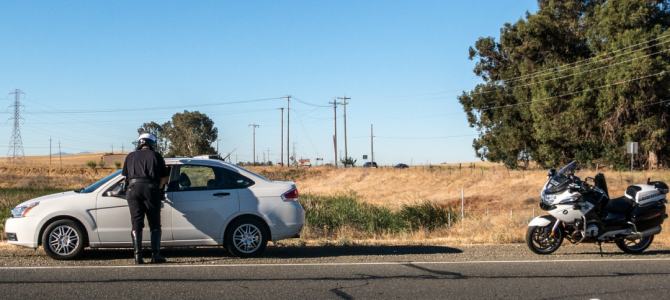
Friar Tuck: You thieving scandal!
Sheriff of Nottingham: Now, take it easy, Friar, I’m just doing my duty.
I remember the first time I heard N.W.A. I was a good little seventh grader, doing my homework and listening to the radio when “Gangsta Gangsta,” the edited version, came on. In that moment, my world changed. No longer was I a good little honor student; I was a good little honor student who listened to hardcore rap.
This presented challenges. Back in ‘88, one could not just download an album. One had to find a friend’s older sibling to loan you a cassette that you could then copy. I found my copy and soon enough I was jamming, quietly so as not to alert the parents, tracks like “F**k Tha Police.” Thus my worldview began to form.
Many things changed between 1988 and 2005, but my views on law enforcement remained firmly in the N.W.A. camp. Then I took a job shooting video for the local NBC affiliate and found myself regularly interacting with police officers. I had previously operated under the assumption that they were all vindictive cretins who lived to harass people. While interacting with cops here and there, my opinion changed. Sure, some of them were vindictive cretins, but many were stand-up guys. They liked to catch bad guys and help people who were genuinely in distress. And most, given enough time, which usually wasn’t much time, would even admit they hated writing traffic tickets. This roused my curiosity.
Traffic cops, though reviled, are usually not a starting point of policy discussions. We think “To Protect and Serve” and move on. But maybe they should be. Police should not reside above us; they exist on our dime to help maintain order. Increasingly, they are not members of the community and thus not invested in fomenting a sense of community. They are enforcers to whom we have little recourse. As they are not too pervasive nor too invasive, we tolerate them.
But should we?
Everyone has a story
I’ve long counted myself as the Mark McGwire of speeding. I cannot count the number of times I have whizzed by speed traps at alarming speeds without being pulled over – the secret is to do it without compunction, to never tap your breaks when you see the officer lying in wait. But my friends and family in other places share very different stories.
One friend was pulled over because the cop thought his headlights were too bright — thank you, xenon bulbs – and decided that warranted a quick check to make sure the driver was sober.
My father was once stopped by police (from the same force that recently made headlines for a slight lack of restraint with regard to shooting a 107-year-old man to death) for turning around at a railroad crossing rather than waiting for a long train, just leaving the yard, to get up to speed and move down the tracks. On another occasion, this time in Damascus, Arkansas, he was stopped for speeding and told if he paid promptly that the offense would not go on his record.
One uncle was stopped for driving the right way down a street that had been temporarily converted to a one-way for an annual festival. Another uncle regularly travels through an intersection with a traffic light and a 15-mph speed limit. More often than not, there is an officer observing that intersection for infractions such as an individual taking his vehicle above idling speed to make it through the light. A friend once had her car searched after her husband was stopped for speeding because she “looked like she was hiding something.” She mused that it turns out slouching is bad for you.
Some years ago, friends of mine embarked on a trip to New Orleans in two vehicles. Alas, one of the crew was not the most cautious of fellows. Upon arriving in the Big Easy, he was quite careless with the keys and left them dangling from the trunk. The trunk of the car the keys belonged to. Parked in downtown New Orleans. That was the last they saw of the vehicle. Thus my friends found themselves facing a conundrum. There were seven of them and there was one car. They had to get home. They did not have the disposable income for a rental. They did not have the disposable income for a plane ticket. Being college kids, they had not filled the trunk with luggage.
Everything was going swimmingly until the trunk rider was spotted reentering his “seat” at a rest stop. Then the full force of the law was unleashed, my friends were pulled over, explanations were offered, and a hearty laugh was shared by all. I am sure they could have been cited for some sort of violation. Perhaps the officers simply were not in the mood to think creatively about the situation.
Another friend, let’s call her Amity, was in a bad spot in life. She was leaving an abusive relationship. It was the summer of 1999. It was hot. Her air conditioner was broken. She was on a rural highway and no other cars were around. Seeking relief from the heat, she removed her bra. That is when Barney appeared and noticed Amity had a busted headlight. Amity was driving at night, in the heat, and not wearing a bra. Obviously, she was a prostitute. I’m not kidding. That’s seriously what the cop suggested.
What’s worse is that the cop, whom she knew and who knew her situation, cuffed and stuffed her and off they took down the country roads, windows down, bugs flying in and covering Amity. “How can you do this?” she asked. “I can loosen the cuffs,” Barney replied.
When they arrived at the jail, there were no female officers present. Rather than follow precedent and wait for one to properly process Amity, Barney threatened to throw her in with the male population. He relented, but she still found herself detained, without immediate recourse, for a broken headlight and a completely understandable decision regarding undergarments that was, frankly, none of the cop’s business.
Amity was never charged, though she did shell out $958 for the stop. All in all, she was relatively lucky. Things could have gone worse.
Though I have avoided ever being ensnared by a speed trap, I am not as good at avoiding minor interactions with traffic patrols. I have been officially warned for driving on the shoulder. I was scolded for texting while driving. That I was at a red light changing songs on my phone and not actually texting likely helped my cause. The officer in the well-marked vehicle next to me looked over and shook his head. I rolled down my window and he said, “No texting while driving.” “I’m not texting, I’m changing songs.” “It’s the same thing.” “Okay, man.”
To serve and protect? Or generate revenue?
In a 2009 interview, James Poulos discussed what he refers to as the “Pink Police State:”
So citizens of a Pink Police State (I should say subjects) are apt to surrender more and more political liberty in exchange for more and more cultural or ‘personal’ license. And the government of a Pink Police State tends to monopolize and totalize administrative control while carving out a permissive playpen for the people.
We tolerate an increasingly omnipresent force that exists not to protect the general welfare or guarantee liberty, in any sense of the word, but to generate revenue. Moreover, that force does not even grant us the liberty of a permissive playpen. In the United States, there is no autobahn.
But the America of Andy Griffith is no more; now we have Barney Fife reborn as the Sheriff of Nottingham, armed with pen and pad, and he is collecting gold, beautiful gold, for the state. He is invasive, but not too invasive. He is pervasive, but not too pervasive. Mostly he is just a nuisance. You are stopped, you listen to the speech, and you may or not find your wallet lighter at the end.
A few years ago, ABC News’ 20/20 program looked at the traffic ticket situation in the city of Warren, Michigan. Turns out a lot of traffic tickets were being written. And many of them came from the same police officer – David Kanapsky.
Anyone who’s been in traffic court can attest that judges usually find the testimony of police officers to be credible. But the 20/20 investigation revealed that the more tickets Kanapsky wrote, the more overtime he got. The previous year he’d been able to increase his pay by $21,000.
That year the town had made half a million dollars in traffic fines. Some drivers told ABC News that the whole thing seemed like “a moneymaking scam.”
Indeed. Such ticket-writing operations only work if police officers have tons of laws to enforce. Speed limits of 15 miles-per-hour may be ridiculously impossible to meet, but they will earn jurisdictions some nice additional revenue.
As the ancient Chinese philosopher Lao Tzu said, “The more prohibitions there are, the poorer the people will be. The more laws are promulgated, the more thieves and bandits there will be.”
It’s also true that these ticket-writing operations only work if police officers are encouraged to enforce those laws without common sense. Failing to stop at a stop sign when someone else is going through an intersection is dangerous. Rolling through a stop sign when no one else is going through the intersection is not. It saves gas and it saves time. When 20/20 surreptitiously videotaped people stopping at stop signs, the vast majority of drivers in Michigan and New York rolled right on through.
And when Warren changed one of the stop signs where Kanapsky wrote many of his tickets to a yield sign, car accidents actually went way down.
What is it about traffic cops that angries up my blood so? It’s this – we do not exist at the whim of government. Government exists with our consent. There is a focus on the large items, the issues which exemplify the distance between bureaucracy and our neighborhoods; the issues that inflame our passions. But why do we value our friends, our neighborhoods?
We value them because they are not faceless authorities subjecting us to their whims, carving out for us a playpen in which we can exercise our approved freedoms. We value them because there is an agreed upon purpose, a shared goal. And that goal is not plugging holes in the budget.
We are not a nation of laws. We are a nation of men who consent to be governed by laws. We consent to be governed by traffic laws, but there is an assumption. That assumption is that traffic laws are objective measurements based on common sense. As evidenced by the money collected and the stories told, that is not the case.
Long ago, a group of determined colonists decided they were done with taxation without representation and the United States was born. She was born without a king. As such, Prince John cannot exist unless we allow him to. By permitting traffic cops, those Sheriffs of Nottingham, extreme leeway and authority, we enable a multitude of Prince Johns. They are focused. They are hungry. They want gold, delicious gold, and have found a way to collect it without appealing directly to the taxpayers. We may no longer be colonists, but we do not have to tolerate it. The sheriffs can only do their duty if we sanction it. Maybe N.W.A. was correct. Maybe we as a nation should not yearn to sing “Kumbaya” but instead join voices in a rousing sing-along of “F**k Tha Police.”







